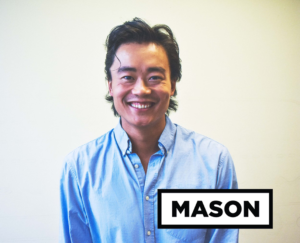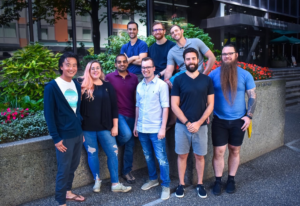Jim Xiao Shares CEO Journey as Mason Growth Takes Off
 The following story on Mason CEO and Founder Jim Xiao appears in the final 2020 issue of the Foster Business Magazine. The interview was conducted in August 2020. The entire issue of the Foster Business Magazine is now available online right now at this link.
The following story on Mason CEO and Founder Jim Xiao appears in the final 2020 issue of the Foster Business Magazine. The interview was conducted in August 2020. The entire issue of the Foster Business Magazine is now available online right now at this link.
Jim Xiao wants to talk to you about his company—and the company he keeps.
In the span of a decade, he went from studying finance at the Foster School of Business to helming a global business. “In the seed-stage, I really enjoyed that thrill, that uncertainty, the stress. It made me feel alive,” says Xiao. “I don’t say that anymore.”
The physical and mental strain took a toll on his health in an unexpected way. The solution, ironically, would require that he do a similar thing for himself that his company does for customers around the world.
Xiao launched Mason in 2015 around the idea of providing a custom hardware and software solution to address the operational bottleneck many businesses face. Xiao describes it as being “the stage crew to our customers, who are the rock stars of their industries.”
Within a year of launching, Xiao’s company graduated from the startup accelerator Y Combinator. He moved his team into a house not too far from the UW campus he used to call home. By 2018, Mason became profitable with over $4 million in revenue and moved again—this time into a new office near Seattle’s waterfront. Things were trending in the right direction, or so he thought.
Transforming quickly
During this crazy period, Xiao gained weight from stress eating, and his dermatologist diagnosed him with psoriasis, a skin condition that erupts from stress. “I was like, wait a minute here,” he says. “Let me connect the dots.”
He realized the healthiest path forward would be to embrace a customized routine, much like his customers do with their business. Yoga and a healthy diet upgraded his body (he lost 30 pounds) and his mind. “I woke up and said if you’re not living a great lifestyle,” Xiao recalls, “how can you assure others that you care about your team members and their work-life balance?”
A core part of Xiao’s mission is to build the business a little differently. The name Mason is derived from the Freemasons, an ancient order dedicated to “the exchange of knowledge and the training of people and apprentices.”
Xiao doesn’t want his company to be traditionally top-down: “You have the Elon Musks and Jeff Bezos’ of the world, but I see opportunity in rethinking the old corporate design.”
He has grown the team with what he calls diverse “diamonds in the rough” who may not fit the standard definition for success at a high-growth startup.
“At Mason, everyone has their ideas, but what supersedes that is thinking about how we start building products on behalf of humanity,” Xiao says. “Not just to be more efficient for money’s sake, but how do we bring in folks who really care about how we transform things quickly? Things like the pandemic, the damages to the environment—if it’s not our generation, it’s the generation after us that’s going to pay the debt.”
Mason solving today’s biggest challenges
Mason was well-positioned before the pandemic arrived, having raised a $25 million investment round in 2019. The company serves eight of the top-12 pharmaceutical companies and has a footprint in more than 50 countries.
“We’ve gone outside of clinical trials in healthcare, beyond hospitals, to medical devices,” Xiao explains. “Now we’re expanding by thinking about what’s top of mind, from considering how to build infrastructure for restaurants coming back from the pandemic, to criminal justice reform and the civil rights movement of today.”
Xiao gives the example of how his team is working with one customer to transform the old technology of ankle bracelets into a smart watch system.
In the meantime, he plans to lean on the idea that people are the sum of the five others they spend the most time with. “My friends are all very entrepreneurial,” he says. “It’s been really gratifying to learn from them and stay humble.
“You have to know your limits and make sure you have the right support group when times get harder than you might anticipate.”
He adds, with a laugh: “You can’t get ‘woke’ without yourself being present.”

